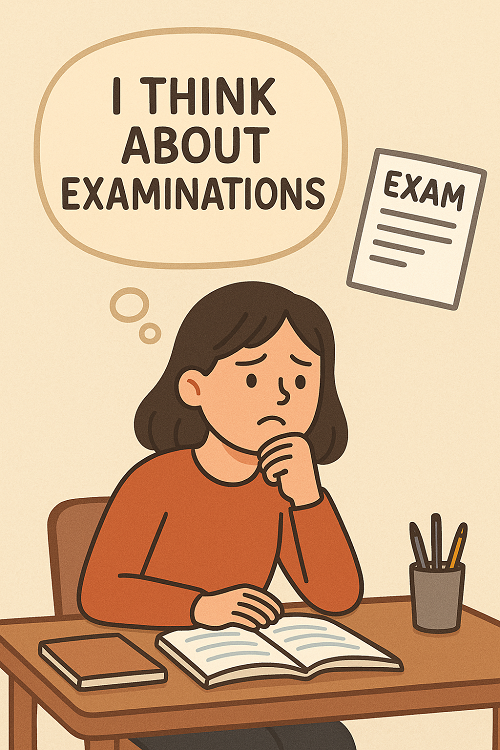In the course of his school or college career a student has to go
through a prescribed course of studies. These studies range over a variety
of subjects. The subjects, again, are such as are calculated to impart to the
student a working knowledge of most things that are of everyday
importance in this world. The higher course of studies as imparted by
college provides for specialisation in more than a test of the student’s
knowledge in the various subjects.
There are various methods in which examinations are conducted.
The method is regulated by the intellectual development of students and by
the subjects. In general, there are three broad principles according to
which examinations are held. These result in the three classes of
examinations, oral or viva voce, written and practical. Oral examinations are, as a rule, confined to tender boys, who
are just beginners and whose intellectual capacity and ability are not so far
advanced as to justify a written examination. In certain exceptional cases
advanced students are subjected to an oral, or as they are better known,
viva voce examinations. In such cases these examinations are designed to
test the thoroughness of a student’s knowledge in a branch. There are
certain subjects in which the soundness of one’s knowledge is best judged
by promptness with which questions are answered. Oral examinations,
which allow the minimum amount of time for thinking, afford the best
facilities for such a test.
Written examinations come next. This method of holding
examinations is by far the most widely adopted. Questions are set and put
into writing and the students have similarly to put down their answers in
writing. There is a fixed period of time in which the questions have to be
answered. This method of examination affords students the maximum
amount of opportunity to think over their answers.
Last of all come the practical examinations. These are limited to
particular subjects, the nature of which demands a practical demonstration
of the students’ knowledge in the subjects in question, in addition to their
theoretical knowledge. Practical examinations are usually held in scientific
subject.
As general test of students’ knowledge and proficiency in any
subject, examinations are all right. But perhaps the highest utility of
examinations lies in the fact that they give students an impetus to prepare
the subjects in which they have to sit for an examination. Leaving aside
the case of sincere and hardworking students, the vast majority of students
are naturally averse to studies. It is an examination which applies the
motive force to the general bulk of students to have a thorough knowledge
of the subjects in which they are to be examined.
But an examination, by its very nature, can never be a real test of
a student’s merit. In an examination, questions can at best be put or set so
as to cover only a limited range of a particular subject. It often happens
that a student having a special knack of selected questions comes out
successful without a complete knowledge of the particular subject. This is
with regard to students of mediocre merit. Meritorious students, too,
labour under certain disadvantages. In written examinations, answer
papers have, of necessity, to be distributed among several examiners who naturally may be of various temperaments and moods. It is not unusual for
the paper of a meritorious student to be examined by one who is strict in
his scrutiny of answer papers, while another less meritorious student may
have the good fortune of having his paper examined by one who is less
strict. In such a case the meritorious student is decidedly at a disadvantage
to the other one. It is luck rather than merit which plays an important part.
The element of luck is even more manifest in practical examinations, in
which the examiners have to draw their question papers as in a lottery.
One student may have an absurdly simple question to tackle with, while
another may find a
correspondingly difficult question. Last, but not the
least, the anxiety of an examination tells heavily upon the mental condition
of students in general.
The above remarks with regard to the disadvantages of
examinations hold good with regard to university examinations. They are
not strictly applicable to school examinations. In the latter, when the
number of students is not necessarily large, some of the anomalies do not
arise. But as, in a discussion of examinations, the question of university
examinations looms large, the following suggestions are made with regard
to them. Instead of holding university examinations at the end of one or
two years, in which case the range of the subjects is naturally large, it
would be better to hold periodical examination covering a comparatively
smaller range as done in America. By this means questions be set to cover
completely the limited range, so that no student can obtain cheap success
at an examination by reading only selected portions of the prescribed
course. Secondly, these examinations should be confined to separate
schools and colleges, by which the individual schools or colleges will have
a small number of students to deal with. This will obviate the necessity of
having a large number of examiners with varying temperaments and will
enable the same set of examiners to examine the same set of students. The
element of luck or chance will in this way be reduced to a minimum, and
merit will have wider scope.
